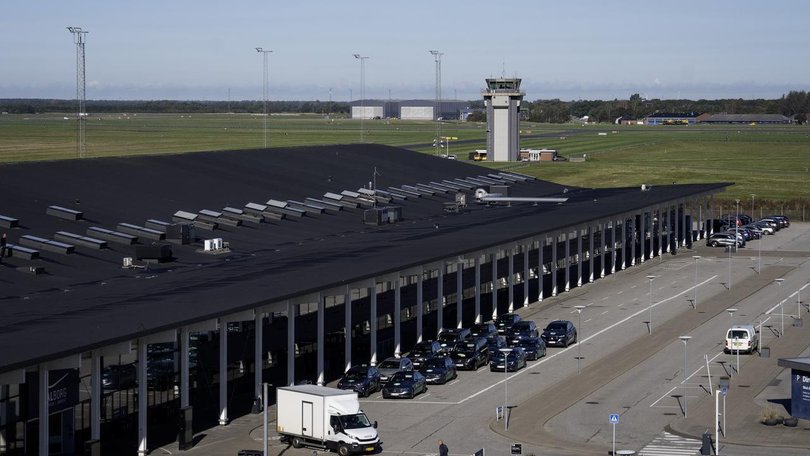Aalborg Airport: Danish authorities reopen air space after further drone activity
Denmark has informed its NATO allies that drone incursions that shut two of its airports are linked to unspecified ‘state actors’, according to Latvia.

The airspace over Denmark’s Aalborg Airport has been reopened after a closure for the second night in a row due to suspected drone activity, police say.
“The airspace over Aalborg Airport has been reopened on Friday at 00.35 (8.35am AEST) after having been shut down due to suspicion of drone activity,” police said in a post on social media X.
The airspace over Aalborg Airport was closed nearly an hour earlier on Thursday after a suspected drone sighting in the area, police told news agency Ritzau.
Sign up to The Nightly's newsletters.
Get the first look at the digital newspaper, curated daily stories and breaking headlines delivered to your inbox.
By continuing you agree to our Terms and Privacy Policy.On the previous evening, Aalborg airport, used for commercial and military flights, was closed for about three hours due to drones in its airspace, just days after the country’s main Copenhagen airport was shut over drone sightings that raised European security concerns.
Denmark reported to NATO allies that unspecified “state actors” were responsible for drone incursions that shut two airports, Latvia’s foreign minister said.
“The Danish government said it’s a state activity that operates it,” Latvian Foreign Minister Baiba Braze said on the sidelines of the UN General Assembly in New York.
But Danish Defence Intelligence Service chief Thomas Ahrenkiel said at a Thursday evening press conference it was still unclear who was behind the incidents and declined to say if a state actor was suspected.
However, Finn Borch, head of Denmark’s national security and intelligence service, told reporters that Russian covert activity poses a security threat.
“The risk of Russian espionage is high. The same goes for the risk of Russian sabotage. We have seen that elsewhere in Europe, and it applies here at home as well,” Borch said.
Russia’s embassy in Copenhagen on Thursday rejected as “absurd” speculation that Moscow was involved in the Danish incursions.
Denmark’s defence minister earlier said the overnight drone sorties were hybrid attacks, combining military and covert tactics, and were aimed at spreading fear.
It is part of what some European officials see as a pattern of Russian disruption that has exposed the vulnerability of European airspace at a time of high tensions between Moscow and NATO.
Braze said Denmark’s allies were waiting for further analysis from Copenhagen.
But the incursions have demonstrated “we all have to invest in counter-drone capability,” she said.
Denmark has not yet decided whether to invoke NATO’s Article 4, which allows members to request consultations over any security concerns, Defence Minister Troels Lund said.
Poland invoked the article after downing the drones, as did Estonia after Russian military jets violated its airspace for 12 minutes on September 19.
